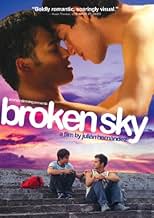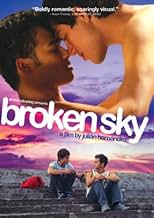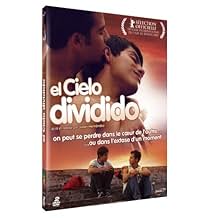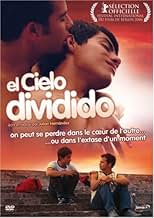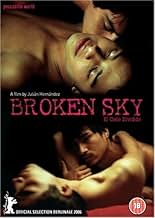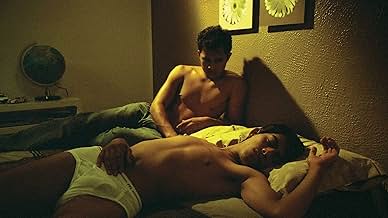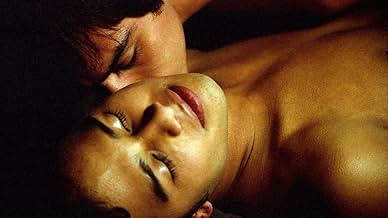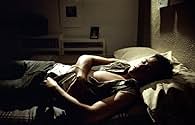IMDb-BEWERTUNG
5,7/10
1259
IHRE BEWERTUNG
Füge eine Handlung in deiner Sprache hinzuTwo students, Gerardo and Jonas, are in love. However, Jonas becomes obsessed with another boy, which leads to Gerardo moving into arms of Sergio.Two students, Gerardo and Jonas, are in love. However, Jonas becomes obsessed with another boy, which leads to Gerardo moving into arms of Sergio.Two students, Gerardo and Jonas, are in love. However, Jonas becomes obsessed with another boy, which leads to Gerardo moving into arms of Sergio.
- Regie
- Drehbuch
- Hauptbesetzung
- Auszeichnungen
- 2 wins total
Clarisa Rendón
- María
- (as Clarissa Rendón)
Empfohlene Bewertungen
This could have been the gay counterpart to Gone With The Wind given its epic lenght, but instead it satisfied itself by being a huge chain of empty episodes in which absolutely nothing occurs. The characters are uni-dimensional and have no other development in the story (there's actually no story either) than looking for each other and kissing. It's a shame that an interesting aesthetic proposition like having almost no dialog is completely wasted in a film than makes no effort in examining the psychology of its characters with some dignity, and achieving true emotional resonance. On top of that, it pretends to be an "art" film by using the worst naive clichés of the cinematic snobbery. But anyway, if someone can identify with its heavy banality, I guess that's fine.
Like João Pedro Rodrigues (Two Drifters), Mexican filmmaker Julián Hernández makes obsessively gay films unlike Almodóvar, whose outlook may be gay but who has achieved almost universal acceptance through his varied milieus, intricately amusing plots and use of women in prominent roles (not to mention his general brilliance as a filmmaker, which neither Rodrigues nor Hernández has yet established). Hernández's sphere is even more narrow than Rodrigues', but more emotionally accessible and less odd. Influences include Cocteau, Pasolini, Wong Kar Wai and the Duras/Resnais collaboration of' Hiroshima mon amour, a line from which is quoted as an epigraph. Unlike Rodrigues', this filmmaker's few characters are not oddballs or obsessives but simply prettier-than-average middle-class Mexico City young men oppressed by love-longing. Like Hernández's previous feature A Thousand Clouds of Peace (2003) in its preoccupations but with higher production values, the subject is a young man whose love object eludes him. Two female characters are barely more than glimpsed in passing. We're examining a gay love affair and nothing else. These are students, but don't ask what their majors are. They spend more time in discos than in classrooms.
As in the previous Hernández feature, plot and dialogue are minimized. There are voiceovers but the characters rarely speak. We get used to their miming their feelings. Gerardo (Miguel Angel Hoppe) picks up Jonas (Fernando Arroyo) in a playing field at the university and the passionate kisses and embraces and the sex begin right away. Then Jonas starts averting his face when Gerardo tries to caress or kiss him. And yet they're still regularly sleeping together. Gradually a third person enters the picture Sergio (Alejandro Rojo), a slightly older man, a tall, dark, brooding fellow, even easier on the eyes than the other two. He has already watched the pair play hide and seek in the library stacks when he was installing a light bulb. Sergio has wanted Gerardo for a long time, or so he says when they finally get together after one of several encounters in a gay-friendly club in this film, everywhere is gay friendly. Scenes take place either around the university, in the guy's rooms, or in a club; all problems other than love are minimized or eliminated. Except for some yellow filters, the photography is pretty, but straightforward. None of Wong Kar Wai's richly grungy pads here: the rooms are conventional middle-class housing, with tasteful prints on the walls and textbooks on the shelves, not palatial but posh for students' digs. The guys only have a few pairs of jeans, but they sure have lots of shirts.
The message that the film conveys and though it is too long, it's basic idea works; the scenes convey the desired feelings and the editing is seamless at first is that two people never seem to love each other at the same time to the same degree in the same way.
But the ending is a happy and romantic one. Once Sergio and Gerardo are a couple, Jonas begins to long for Gerardo again, and in the final scene, they've gotten back together.
Broken Sky is more like a poem or an opera or most of all, a dance than a conventional film. It's a different experience. The mainstream audience would never put up with all this gay sex without dialogue or plot. Not every gay man will have the patience to watch these amorous comings and goings for the full 140 minutes, either. I'm not sure that the poetic voiceovers were necessary; and a third of them are lost to non Spanish-speakers because the white-on-white subtitles are illegible. They are a bit too poetic and general. The boys are too specific to be so generalized by the language. Needless to say, "the real world" is beyond the range of Broken Sky. But there's no denying that Broken Sky in its own way is unique and beautiful. The director achieves what he was clumsily groping for in his first one. He is using cinematic language in a way that it rarely is any more he achieves the instinctive identification and emotional directness of the silent film. Broken Sky makes you think about the unspoken element in any relationship, the things that can never be communicated in words: in short, the world of eroticism and feelings. Hernández contributes to the effectiveness of his visual poem through excellent use of various musical accompaniments, a few notes on a clavicord, a string quartet above all, a sweet pop love song the lyrics of each lovingly translated in subtitles. It's as if Gerardo and Jonas were trying to live a pop song. And I guess that's what moony young gay guys do a lot of the time. There's even a coloratura operatic aria; considering the operatic tone of things, the filmmakers exercise great forbearance in using only one. Maybe this is "a new cinematic language," as was said of Antonioni's L'Avventura. For a while one can savor it, admire the naive sweetness of it. But can anyone read it? And can it say more than one thing?
As in the previous Hernández feature, plot and dialogue are minimized. There are voiceovers but the characters rarely speak. We get used to their miming their feelings. Gerardo (Miguel Angel Hoppe) picks up Jonas (Fernando Arroyo) in a playing field at the university and the passionate kisses and embraces and the sex begin right away. Then Jonas starts averting his face when Gerardo tries to caress or kiss him. And yet they're still regularly sleeping together. Gradually a third person enters the picture Sergio (Alejandro Rojo), a slightly older man, a tall, dark, brooding fellow, even easier on the eyes than the other two. He has already watched the pair play hide and seek in the library stacks when he was installing a light bulb. Sergio has wanted Gerardo for a long time, or so he says when they finally get together after one of several encounters in a gay-friendly club in this film, everywhere is gay friendly. Scenes take place either around the university, in the guy's rooms, or in a club; all problems other than love are minimized or eliminated. Except for some yellow filters, the photography is pretty, but straightforward. None of Wong Kar Wai's richly grungy pads here: the rooms are conventional middle-class housing, with tasteful prints on the walls and textbooks on the shelves, not palatial but posh for students' digs. The guys only have a few pairs of jeans, but they sure have lots of shirts.
The message that the film conveys and though it is too long, it's basic idea works; the scenes convey the desired feelings and the editing is seamless at first is that two people never seem to love each other at the same time to the same degree in the same way.
But the ending is a happy and romantic one. Once Sergio and Gerardo are a couple, Jonas begins to long for Gerardo again, and in the final scene, they've gotten back together.
Broken Sky is more like a poem or an opera or most of all, a dance than a conventional film. It's a different experience. The mainstream audience would never put up with all this gay sex without dialogue or plot. Not every gay man will have the patience to watch these amorous comings and goings for the full 140 minutes, either. I'm not sure that the poetic voiceovers were necessary; and a third of them are lost to non Spanish-speakers because the white-on-white subtitles are illegible. They are a bit too poetic and general. The boys are too specific to be so generalized by the language. Needless to say, "the real world" is beyond the range of Broken Sky. But there's no denying that Broken Sky in its own way is unique and beautiful. The director achieves what he was clumsily groping for in his first one. He is using cinematic language in a way that it rarely is any more he achieves the instinctive identification and emotional directness of the silent film. Broken Sky makes you think about the unspoken element in any relationship, the things that can never be communicated in words: in short, the world of eroticism and feelings. Hernández contributes to the effectiveness of his visual poem through excellent use of various musical accompaniments, a few notes on a clavicord, a string quartet above all, a sweet pop love song the lyrics of each lovingly translated in subtitles. It's as if Gerardo and Jonas were trying to live a pop song. And I guess that's what moony young gay guys do a lot of the time. There's even a coloratura operatic aria; considering the operatic tone of things, the filmmakers exercise great forbearance in using only one. Maybe this is "a new cinematic language," as was said of Antonioni's L'Avventura. For a while one can savor it, admire the naive sweetness of it. But can anyone read it? And can it say more than one thing?
The unique film "Broken Sky" is an invitation to a different world, a quiet and dreamlike place where only love seems to hold any importance. The characters Gerardo and Jonas inhabit this private world, and no one else matters. Filmed in beautiful gold and brown shades, the two Mexican boys fall in love at first sight. The two are so in sync with each other that they barely need words to communicate their feelings. It seems things could not be more ideal for these two guys, until outside influences and doubt threaten to destroy their perfect, untainted love. "El Cielo Dividido" is not really a mainstream film; there is virtually no dialog, and the production moves along like a slow, hypnotic dance, rather than the typical fast pace of todays cinema. There has rarely been a film that so effectively creates it's own world, and it is a world filled with beauty and romance and sadness, a world that i personally was reluctant to leave at the film's end. Actors Miguel Angel Hoppe and Fernando Arroyo are both beautiful and utterly believable as the confused lovers, overwhelmed by intense feelings that are so new to them. Unique especially for "gay cinema" is this film's subtlety. The nudity and sexuality is not aggressively splashed across the screen to shock or titillate the viewer. It is simply there, and it is all a part of this private world of the two lovers. Best of all, "Broken sky" manages to recreate the feelings of first time love and sexual awakening like few films have managed. This is far from the typically flashy and garishly silly style of most gay films. Thankfully, there are no gay stereotypes to be found here; this is a film about love, and nothing more. "Broken Sky" is a unique and beautiful film.
Saw it at SIFF. This is a different kind of film -- but I loved it. I loved the fact that there wasn't a lot of dialogue. I appreciated the non-verbal aspects of this film. While the lack of dialogue some may find tedious it was nice to see something that wasn't shot for the small screen, something that made me pay attention visually, and something that made me think a bit. I thought the camera technique used to convey the passage of time was quite effective. The only technical aspect which drove me nuts was the use of white subtitles on a white background; fortunately this was a small, small part of the film but at key junctions in the story development. I'm rather fond of this film and would like to watch it again.
10mansart
I guess it's not surprising that this film received mixed reviews. I knew when I saw it that it would not be for everyone. I have to say though that I really loved this film and would gladly see it again, particularly to share it with someone I care for.
I think you have to just sit back, relax and let this film wash over you. The best way for me to describe it is as a beautiful poem about love, particularly young love. It conveys all the thrill and excitement, the confusion and pain, the jealousy and longing...really all the emotions one experiences from first love. Rather than words, however, this poem is composed of pictures and music and ambient sound. Like a poem it isn't always straightforward, you don't always understand every moment, but the feelings that it evokes are strong and genuine, and it captures universals in a way that a more specific, narrative film never could.
The director has said that the reason there is so little dialogue is that the moments he chose to capture were the ones between the dialogue; before the characters felt the need to speak, and after they had said all there was to say. What's amazing is how illuminating those moments are when one chooses to pay attention to them.
In the context of this film I'm not sure what the phrase "gratuitous male nudity" means. Although I know it never happens in the U.S., in other countries people get naked. It's part of life. It's certainly part of the relationship that this film is all about, and to show it, unceremoniously, as part of the fabric of a life and a relationship can hardly be described as "gratuitous".
I guess the best compliment I can pay this film is to say that I am still thinking and talking about it, weeks after seeing it. The camera work, the composition, the use of sound and music, and the contribution of the young stars, all contribute to the film's success. If you enjoy film-making as an art form, I'd highly recommend you seek out this film.
I think you have to just sit back, relax and let this film wash over you. The best way for me to describe it is as a beautiful poem about love, particularly young love. It conveys all the thrill and excitement, the confusion and pain, the jealousy and longing...really all the emotions one experiences from first love. Rather than words, however, this poem is composed of pictures and music and ambient sound. Like a poem it isn't always straightforward, you don't always understand every moment, but the feelings that it evokes are strong and genuine, and it captures universals in a way that a more specific, narrative film never could.
The director has said that the reason there is so little dialogue is that the moments he chose to capture were the ones between the dialogue; before the characters felt the need to speak, and after they had said all there was to say. What's amazing is how illuminating those moments are when one chooses to pay attention to them.
In the context of this film I'm not sure what the phrase "gratuitous male nudity" means. Although I know it never happens in the U.S., in other countries people get naked. It's part of life. It's certainly part of the relationship that this film is all about, and to show it, unceremoniously, as part of the fabric of a life and a relationship can hardly be described as "gratuitous".
I guess the best compliment I can pay this film is to say that I am still thinking and talking about it, weeks after seeing it. The camera work, the composition, the use of sound and music, and the contribution of the young stars, all contribute to the film's success. If you enjoy film-making as an art form, I'd highly recommend you seek out this film.
Wusstest du schon
- VerbindungenReferenced in Family Guy: Road to Rupert (2007)
- SoundtracksEn mi cielo
Written and performed by Volovan
By Arrangement with Universal Music Mexico
Top-Auswahl
Melde dich zum Bewerten an und greife auf die Watchlist für personalisierte Empfehlungen zu.
Details
- Erscheinungsdatum
- Herkunftsland
- Offizielle Standorte
- Sprache
- Auch bekannt als
- El cielo dividido
- Drehorte
- Produktionsfirmen
- Weitere beteiligte Unternehmen bei IMDbPro anzeigen
Box Office
- Bruttoertrag in den USA und Kanada
- 29.185 $
- Eröffnungswochenende in den USA und in Kanada
- 4.956 $
- 1. Okt. 2006
- Weltweiter Bruttoertrag
- 160.445 $
- Laufzeit
- 2 Std. 20 Min.(140 min)
- Farbe
- Sound-Mix
- Seitenverhältnis
- 1.85 : 1
Zu dieser Seite beitragen
Bearbeitung vorschlagen oder fehlenden Inhalt hinzufügen

